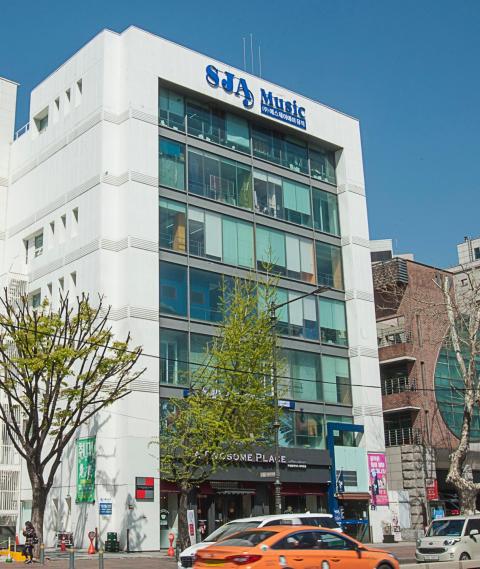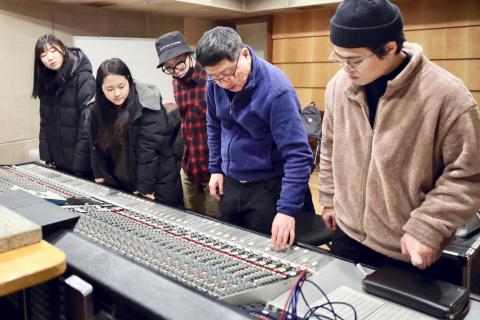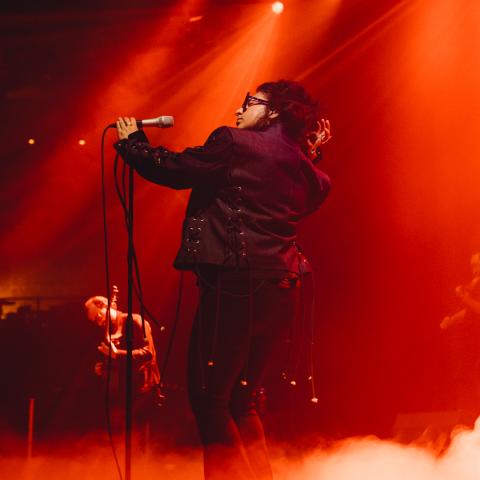A Wave of Talent
For the past four years, before the coronavirus disrupted life in South Korea, Jaeho Lim would head to SJA Music Institute on Saturday and Sunday afternoons to load up a large cart with a five-piece drum kit, a synth, a bass and guitar amps, and a PA system. He’d then push all of it several blocks down a busy street in Seoul, to the spot where SJA students would put on a free outdoor show.
As a senior manager at SJA, Lim wasn’t technically obliged to do the weekend work, but he showed up anyway. It’s a matter of dedication.
“SJA is not just about education; we want to be part of students’ lives, to always encourage them and provide hands-on support,” Lim says. He wants to help provide a path for these students, to let them know they can make a living in the arts, adding that “the responsibility lies in our generation and to ensure that the next generations do not face the same difficulties as ours.”
Listening closely to Lim’s words—support, goals, responsibility—it’s clear why SJA Music Institute, a Berklee partner school since 1998, has been so successful in training some of the country’s top talent. The school has sent three of South Korea’s five presidential scholars to Berklee, and in the past four years alone has had 139 students accepted to the college. Still, SJA’s president, Chang Ho Kim, is aiming higher: “We want to send students to Berklee who are even more qualified and talented.”
That’s saying something in a country that’s becoming known for its performing-arts talent. The so-called Korean Wave—the rise of Korean pop culture—started hitting Western shores about a decade ago. After the video for the 2012 Psy ‘00 song "Gangnam Style" became the first to surpass a billion views on YouTube (to be unseated five years later by Charlie Puth B.M. '13), Korean culture—from music to makeup to movies—has continued to flow into the West.
The movie Parasite—scored by SJA alumnus Jung Jae II—became the first foreign-language film to win an Oscar for Best Picture.
A case in point: Among YouTube’s most-watched videos within 24 hours, four are from South Korean bands, such as the supernova BTS, the world's most tweeted-about musicians for the past three years. And in February, the South Korean movie Parasite—scored by SJA alumnus Jung Jae Il—became the first foreign-language film to win an Oscar for Best Picture.
As with Jung Jae Il, SJA alumni are in every corner of this rising Korean Wave. Hyojin Kim is the founder of the popular YouTube channel Jazz Avenue, while another alumnus, guitarist Sungha Jung, has 6 million subscribers to his YouTube channel. Ji Won Hwang B.M. ’14, M.A. ’15, the YG Entertainment 2019 tour manager for megagroup Blackpink, says that her time at SJA gave her the foundation to succeed. “I learned the basic principles of music at SJA,” she says. For this, she adds, “my heart is always with SJA.”
‘Baptized by Music’

Haein Erin Lee B.M. ’10, M.A. ’13, SJA’s manager of global initiatives and school development, likens the diploma program to being “baptized by music.” The 100 or so students in the diploma program follow an intensive 18-month course in which they study vocal or instrumental performance, film scoring, sound engineering, or songwriting. Only the performance course credits are transferable to Berklee; still, most students are able to transfer between five to six semesters’ worth of credits to Boston, saving a substantial amount of money since they can live at home while studying in Seoul and pay a lower tuition than they would in Boston.
But beyond bestowing credits, the institute ensures that students are prepared for Berklee in other ways.
Hyunwoo Han B.M. ’08, the academic chair, says that he tries to give students an experience that will approximate the one they’ll get at Berklee. One thing in particular he draws on from his own years in Boston is how Berklee tried to develop each student’s unique abilities. “That helped a lot teaching students after Berklee. I tried to figure out the student’s own character, their own strong point,” he says.
It’s this bond between Berklee and SJA—the one that goes beyond academic agreements—that helped draw voice student Dong Hwan Lee, 21, to SJA. He values the fact that nearly a third of the school’s 73 teachers are Berklee alumni and says that their guidance will help him feel more comfortable when he arrives in Boston.
“They know about Berklee. They tell us stories about Berklee. They know what strengths of ours would be maximized when we audition and go spend our time in Berklee,” he says.
Furthermore, Berklee alumni who have attended SJA retain a strong connection to the institute. They regularly come back to the school to jam with students and interact.
“This can work as an airbag to decrease the amount of shock that [Korean students] will receive from being exposed to a new environment,” Dong Hwan Lee says. Because these dual alumni share stories of life at Berklee and in Boston, he says he gets “inside information. It [won’t be] just me being left around, looking for something. I already know what I’m doing. I already know where I’m going.”
SJA sees these hard and soft connections as vital, and works to keep them active by sponsoring jam sessions, maintaining online alumni groups, and hosting clinics by visiting Berklee faculty.
The Electronic Surge
The school is so plugged in to what’s going on at Berklee that when the Boston campus decided to add electronic digital instruments (EDIs) to its list of principal instruments last fall, SJA took note and enlisted Jaehyun Wang B.M. ’17, a graduate of Berklee’s electronic production and engineering program, and Red Bull champion DJ Ju Hwan You, also known as DJ J.fitz, to help develop an EDI program for SJA. It was launched in October.

“Nowadays the younger generation wants to learn about digital music,” President Kim says. “We have to pursue that kind of trend for the future, so we decided to expand to digital music, to EDI, to EDM [electronic dance music], and other digitalized music.” This trend is being largely driven, he says, by the growth of K-pop. “So many in the younger generation want to learn K-pop and want to be a K-pop musician,” he says.
They also want to take advantage of the many engineering and production opportunities the genre offers. In Korea, large venues must hire licensed sound engineers, and SJA is the only school in the nation to offer a government-subsidized program—unrelated to the EDI program—for this license.
Riptide Under the Korean Wave, or a New Crest?
Despite the boom in Korean media, the landscape for a music school in Seoul is a challenging one. Although SJA has top-notch faculty as well as enviable facilities that include a recording studio, concert hall, DJ/MIDI labs, and more than 90 practice rooms, it faces stiff competition, which is causing a slight decrease in enrollment. This is largely because of the explosion in the number of music schools in Seoul, the country’s worsening economic situation, and the nosedive in the national fertility rate (the average number of children per woman recently dropped below one, the lowest in the world).
But Kim, a businessman who owns the West Bridge Entertainment company and venue as well as Sillymann kitchenware, sees opportunity for growth. “We want to be more international,” he says. “We’re always searching for some kind of opportunity to expand our brand, our schools, in other areas—locally and in other countries.” Kim, who’s owned SJA since 2011, says he sees Southeast Asia as the school’s future market. The institute is currently developing a project with a Chinese company and is “looking into the opportunities in Vietnam,” Haein Erin Lee says.
SJA is also starting to develop a relationship with CJ Foundation. “We’re hoping to open up more opportunities and collaboration,” she says. The foundation sponsors the CJ Presidential Scholarship at Berklee—offering a full scholarship to one Korean student every year—and, with Berklee, cofunds several CJ Music Scholarships. This year, two CJ scholarship recipients were from SJA.
Today, the school is regaining its footing as the worst of South Korea’s coronavirus pandemic ebbs. In early April, SJA reopened after shutting down for three weeks in March. It is diligently protecting its community by sanitizing its facilities twice a day, spacing seats apart from each other, and requiring everyone who comes in to disinfect their hands, have their temperature checked, and wear masks.
Although the outdoor weekend shows, which are among the 100-plus off-campus student performances each year, have temporarily stopped, SJA is moving ahead. With luck, soon Jaeho Lim will head back to work on Saturdays and Sundays, fill up his cart, and help SJA students bring music back to the streets of Seoul.
This article appeared in the spring 2020 issue of our alumni magazine, Berklee Today.




